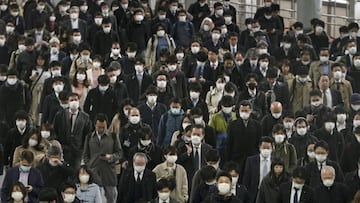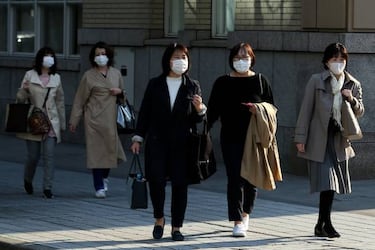Coronavirus: Japan's path to Covid-19 state of emergency
Having been held up as an example of how to deal with the coronavirus pandemic, Japan is now in a state of emergency after a surge in cases.

The sharp rise in coronavirus cases in Japan led prime minister Shinzo Abe to declare a month-long state of emergency in the country this week, the first time this has happened since the Japanese constitution came into effect in 1947.
Having initially been held up as an example of effective coronavirus management, Japan had registered more than 2,000 coronavirus cases in the 10 days leading up to the move - and, with Tokyo the epicentre of the pandemic in the Asian nation, the number of infections has now surged upwards to over 5,500.
So what has changed?
Japan was one of the first countries to confirm cases - there had been 66 by 17 February - and many factors seemed to suggest it would be vulnerable. It is the country with the highest proportion of over-65s in the world (28%) and also has a large number of smokers among its population. What’s more, most of its people live in one of its major cities.
Government's hands-off response enjoys early success
However, the government opted for a largely hands-off response, avoiding closing off the borders to any of its regions or urging people to stay at home. When it came to the coronavirus, the chief worldwide focus on Japan centred around this summer’s Olympic Games, which were finally postponed until July 2021.
The only noteworthy moves made were the closure of schools and official advice to avoid large gatherings as, for a period, Japan managed to keep its case count to below the 1,500 mark and its death toll to beneath 50.
"We could find ourselves in a situation similar to the US or countries Europe"
Kenji Shibuya, the director of the Institute for Population Health at King’s College London, outlined some of the reasons for the country’s seeming initial success in an interview with the BBC, explaining: “Japan has been very successful in containing the spread of Covid-19 by focusing on groups of outbreaks, that is, people who infect other people. They have been tested and they have been isolated.”
However, Shibuya also sounded a note of caution: “It’s not a good idea to send out the signal that we’re doing well, and can re-open schools across the country or let events start up again. That would be the wrong message. We need to be very careful; otherwise, we could find ourselves in a situation similar to the United States or countries in Europe.”
Two further factors seen as contributing to Japan’s apparent containment of the coronavirus was the culture of social distancing that already existed among its residents. It’s normal to see people wearing face masks on the streets and avoiding physical contact. This, it seemed, would help to curb the spread of the virus.

But this did not turn out to be the case.
The rate of infection in Japan has shot upwards in April, with overall cases heading towards 6,000 as the country this week reported more than 500 new positives in a single day for the first time. Not so long ago, this would have been inconceivable.
Spring celebrations in late March seen as potential trigger for coronavirus spike
One thing experts have pointed to is the number of spring celebrations held on the weekend of 21 and 22 March. Large crowds came together to mark the blooming of cherry trees, with Yuriko Koike, the governor of Tokyo, insisting that suspending such events would be “like taking hugs away from the Italians”.
In the days that followed, Hiroshi Nishiura, a professor of epidemiology at the University of Hokkaido, was unequivocal: “People are not approaching this pandemic with the attitude that this is a crisis and that their actions will impact on others. There could be an explosion of cases like in the US and Europe.”
Commuters still thronging trains after state of emergency declared
So it proved - yet on Wednesday, the first day after Abe’s declaration of a state of emergency, commuters were reportedly still crowding trains on their way into bustling offices, in a country that does not have a culture of working from home.
What’s more, Japan is a place where - unlike nations such as Spain - citizens cannot legally be placed under lockdown and punished for not staying at home.
Related stories
Three months after its first positive coronavirus test, Japan is facing one of the greatest healthcare challenges of its history. The most alarming situation is in Tokyo, where cases are growing at a very fast pace - and are threatening to leave the city’s hospitals unable to cope.
Follow live coverage of the coronavirus pandemic